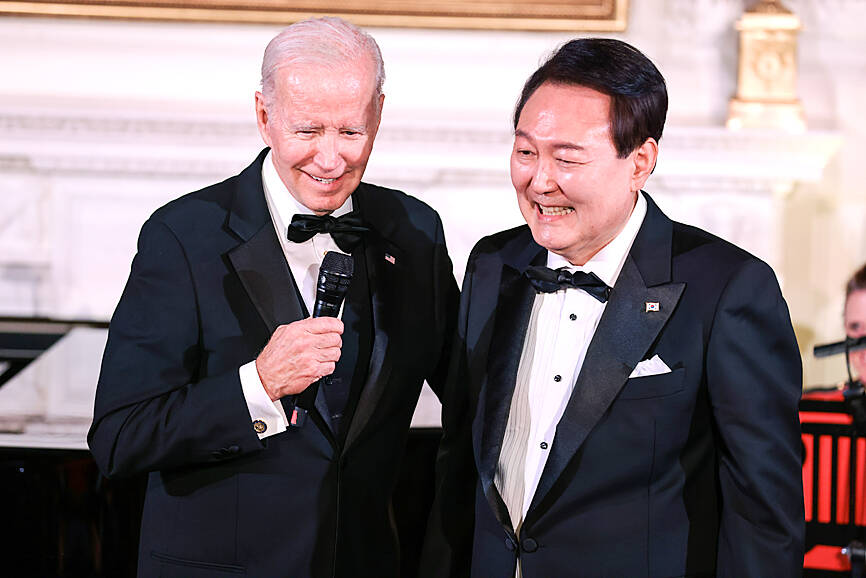US President Joe Biden and South Korean President Yoon Suk-yeol highlighted the importance of maintaining peace and stability across the Taiwan Strait in a joint statement issued after the two leaders met in Washington.
Yoon arrived in the US on Tuesday for a state visit, and met with Biden on Wednesday to commemorate the 70th anniversary of the alliance between the two nations.
Biden and Yoon “reiterated the importance of preserving peace and stability in the Taiwan Strait as an indispensable element of security and prosperity in the region,” the statement said.

Photo: EPA-EFE
The two leaders “strongly opposed any unilateral attempts to change the status quo in the Indo-Pacific, including through unlawful maritime claims, the militarization of reclaimed features and coercive activities,” it said.
The Ministry of Foreign Affairs yesterday welcomed the statement, saying that cross-strait peace and stability are the core of a safe and prosperous Indo-Pacific region.
The statement demonstrated that safeguarding the Taiwan Strait is a consensus among the democratic community and linked to key global interests, the ministry said.
Biden and Yoon also reaffirmed their commitment to preserve lawful access to the South China Sea and beyond, including unimpeded commerce and freedom of navigation, the statement said.
The two countries are set to expand cooperation in the Indo-Pacific region, singling out economic coercion as one of the issues of deep concern, it said.
The leaders oppose “harmful uses of economic influence, including economic coercion as well as use of opaque tools with respect to foreign firms,” and plan to cooperate with like-minded partners to counter the issues, it said.
The leaders vowed to work together, along with Japan, to “ensure the future of the Indo-Pacific is free, is open, prosperous and secure,” Biden said at a news conference after meeting with Yoon.
South Korea and the US are “key partners in achieving stability and building peace in the Indo-Pacific region,” and have agreed to work together to tackle regional and global challenges, Yoon said at the news conference, without directly mentioning Taiwan.
The two leaders also issued what they called the Washington Declaration to demonstrate their commitment to “develop an ever-stronger mutual defense relationship” by facilitating dialogue and information sharing, and improving joint exercises and training activities to counter growing nuclear threats faced by South Korea.

AIR SUPPORT: The Ministry of National Defense thanked the US for the delivery, adding that it was an indicator of the White House’s commitment to the Taiwan Relations Act Deputy Minister of National Defense Po Horng-huei (柏鴻輝) and Representative to the US Alexander Yui on Friday attended a delivery ceremony for the first of Taiwan’s long-awaited 66 F-16C/D Block 70 jets at a Lockheed Martin Corp factory in Greenville, South Carolina. “We are so proud to be the global home of the F-16 and to support Taiwan’s air defense capabilities,” US Representative William Timmons wrote on X, alongside a photograph of Taiwanese and US officials at the event. The F-16C/D Block 70 jets Taiwan ordered have the same capabilities as aircraft that had been upgraded to F-16Vs. The batch of Lockheed Martin

GRIDLOCK: The National Fire Agency’s Special Search and Rescue team is on standby to travel to the countries to help out with the rescue effort A powerful earthquake rocked Myanmar and neighboring Thailand yesterday, killing at least three people in Bangkok and burying dozens when a high-rise building under construction collapsed. Footage shared on social media from Myanmar’s second-largest city showed widespread destruction, raising fears that many were trapped under the rubble or killed. The magnitude 7.7 earthquake, with an epicenter near Mandalay in Myanmar, struck at midday and was followed by a strong magnitude 6.4 aftershock. The extent of death, injury and destruction — especially in Myanmar, which is embroiled in a civil war and where information is tightly controlled at the best of times —

Taiwan was ranked the fourth-safest country in the world with a score of 82.9, trailing only Andorra, the United Arab Emirates and Qatar in Numbeo’s Safety Index by Country report. Taiwan’s score improved by 0.1 points compared with last year’s mid-year report, which had Taiwan fourth with a score of 82.8. However, both scores were lower than in last year’s first review, when Taiwan scored 83.3, and are a long way from when Taiwan was named the second-safest country in the world in 2021, scoring 84.8. Taiwan ranked higher than Singapore in ninth with a score of 77.4 and Japan in 10th with

China's military today said it began joint army, navy and rocket force exercises around Taiwan to "serve as a stern warning and powerful deterrent against Taiwanese independence," calling President William Lai (賴清德) a "parasite." The exercises come after Lai called Beijing a "foreign hostile force" last month. More than 10 Chinese military ships approached close to Taiwan's 24 nautical mile (44.4km) contiguous zone this morning and Taiwan sent its own warships to respond, two senior Taiwanese officials said. Taiwan has not yet detected any live fire by the Chinese military so far, one of the officials said. The drills took place after US Secretary